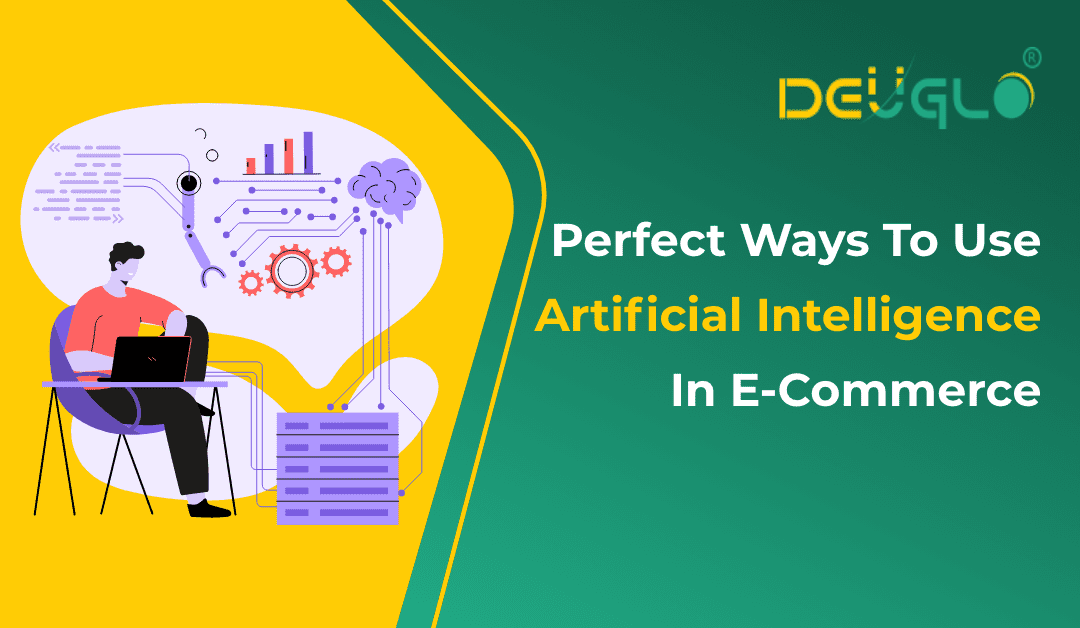Artificial Intelligence in E-Commerce
AI is currently being used in many different aspects of our society today. AI systems are being implemented into ecommerce platforms to help automate marketing strategies. This allows firms to focus more time on their core competencies and gain greater awareness of customers’ needs. AI plays a vital role in helping businesses to provide great customer service and build stronger relationships with its clients.
Perfect ways to use Artificial Intelligence in E-Commerce
Optimizing Your Marketing & Sales Processes With AI
Artificial intelligence (AI) is not just a buzzword anymore – it’s an emerging technology that has the potential to change the way we live our lives. This technological wave is reshaping industries across multiple sectors including retail, medicine, banking, insurance, education, automotive, media, manufacturing, and more.
As e commerce grows, retailers are using AI to improve their marketing processes, increase sales conversions, and drive profits. AI can analyze massive amounts of data and identify patterns within your customer base. Then use this information to predict what customers want before they even ask. The result? More sales, higher conversion rates, and happier customers.
Here are some ways that retailers have been leveraging the power of artificial intelligence in order to optimize their marketing and sales processes:
Improve Customer Service Using Predictive Analysis
Retailers can use predictive analysis to predict customer behavior based on past purchases. Once you learn how your customers behave, you can use that knowledge to create personalized experiences. Retailers like ShoeDazzle, who provide personal shopper services, are able to send emails that suggest items tailored to each individual’s preferences. By combining data from different sources, you can create a complete picture of each customer.
Voice Search Technology
Voice search technology has been around since 2013 and it has become increasingly popular over time. This type of technology allows people to speak instead of typing out their queries. Amazon Alexa, Apple Siri, Google Assistant, Microsoft Cortana are some examples of voice search technology that have been widely used.
Chatbots
Chatbot technology is becoming more popular, especially among e-commerce platforms. Some platforms like Facebook Messenger offer bots where people can ask questions about products and receive answers back. Other chatbots allow customers to compare prices across different online stores.
Augmented Reality
Augmented reality is another technology that has shown great promise when it comes to e-commerce. Customers can use their smartphones to scan items while shopping online. They can then view product details and images in real time using augmented reality.
Improve Customer Experience (CX)
Artificial intelligence can help e-retailers improve their customer experience through predictive analytics. This type of AI helps businesses understand what people want before they even ask for it. Predictive analytics can predict customers’ purchasing behavior based on previous purchases and online activity. They can determine whether someone is likely to buy a product or not. Retailers can use this information to offer products that are relevant and useful to their target audience.
Optimize Inventory Management
Inventory management has become increasingly complex due to the rise of omni-channel retailing. With e-commerce retailers operating across multiple channels and marketplaces, managing inventory becomes challenging. Using artificial intelligence, retailers can optimize inventory allocation and reduce costs. Through machine learning, these systems learn from data generated over time about each individual retailer’s business model and usage patterns. As a result, they can make recommendations to optimize inventory levels and minimize expenses.
Personalized Product Recommendations
Retailers can utilize artificial intelligence to recommend personalized products to shoppers. These recommendations can take into account factors like previous purchases, location, and demographic traits. Machine learning algorithms analyze consumers’ shopping habits and purchase behaviors. Based on this analysis, they generate predictions about future buying trends. Based on these predictions, the system recommends items that may interest the consumer.
Recommendation Engine
Recommendation engines are a great way to increase revenue. They can help businesses get smarter about their customers’ preferences and increase conversion rates. Customer recommendations are often used on social media sites. When your customer goes to post something on Twitter, they may have noticed that a few other people have already posted similar content. They might choose not to post if they aren’t sure what the community thinks. A recommendation engine can predict these types of preferences and allow them to post without fear of getting negative feedback.
Shopping Assistant
Shopping assistants are becoming more common online. Some e-commerce sites offer simple shopping assistants that let users buy products with just a couple clicks. These programs recommend products based on previous purchases. An example of this would be Amazon’s Alexa service. This system understands natural language input and allows the user to ask questions like, “Alexa, play some music,” and she’ll search through her vast catalog of songs stored on her hard drive. Amazon has even developed their own voice assistant as well.
Image Recognition
Image recognition is yet another great use for artificial intelligence. There are many ways this technology could be used in e-commerce. Imagine being able to recognize a product from an image. You could then create a shopping list based on past purchases. Another idea would be to track how often certain items were ordered. If someone had bought bananas consistently over a period of time, perhaps you should automatically add them to their shopping cart.
Conclusion
The future of e-commerce has been full of hype for many years, although we can say that the industry is still at its infancy stage. Some companies are already using AI in their customer service department. Many experts believe that this technology will change the way people shop online and interact with each other. However, AI will not replace human interaction but rather create a symbiotic relationship between humans and machines. This means that humans will have the opportunity to focus on tasks where they excel while the machine will handle repetitive tasks.
Deuglo Artificial Intelligence Services for E-Commerce Business help you increase profits, develop products and manage your entire business.

